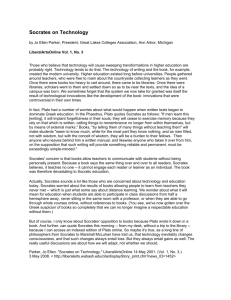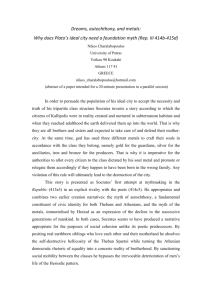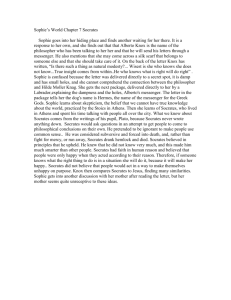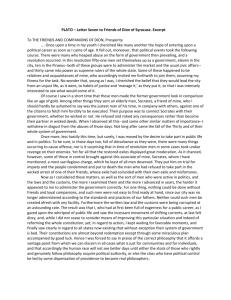Teaching from Socrates to Cyberspace by Luke Prodromou
advertisement
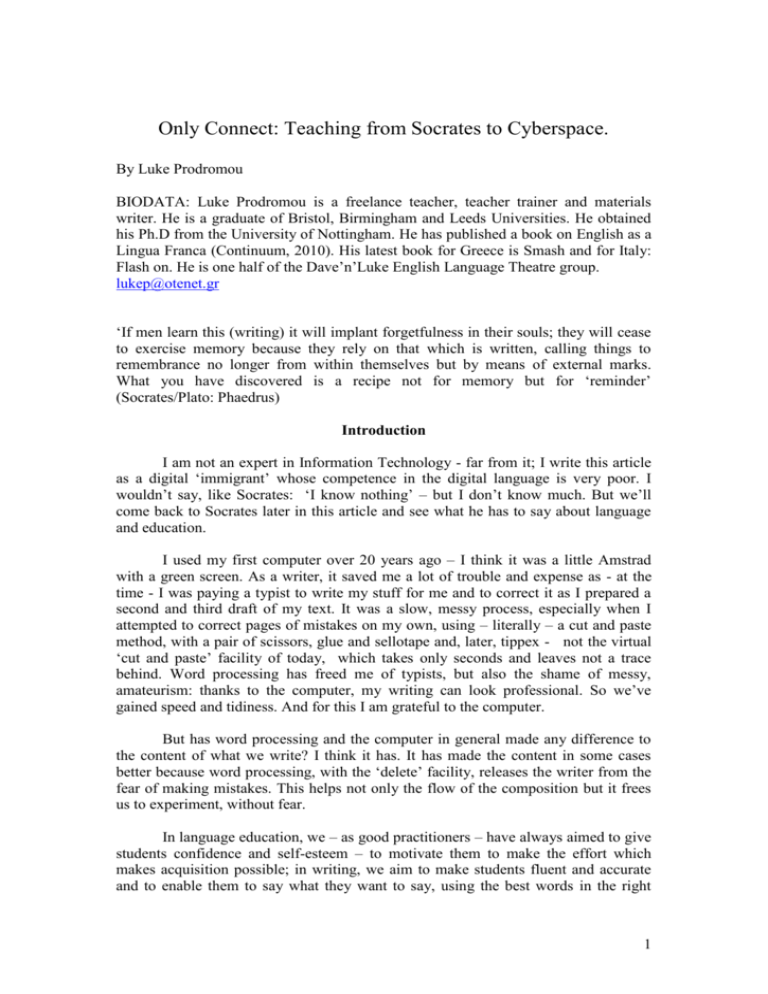
Only Connect: Teaching from Socrates to Cyberspace. By Luke Prodromou BIODATA: Luke Prodromou is a freelance teacher, teacher trainer and materials writer. He is a graduate of Bristol, Birmingham and Leeds Universities. He obtained his Ph.D from the University of Nottingham. He has published a book on English as a Lingua Franca (Continuum, 2010). His latest book for Greece is Smash and for Italy: Flash on. He is one half of the Dave’n’Luke English Language Theatre group. lukep@otenet.gr ‘If men learn this (writing) it will implant forgetfulness in their souls; they will cease to exercise memory because they rely on that which is written, calling things to remembrance no longer from within themselves but by means of external marks. What you have discovered is a recipe not for memory but for ‘reminder’ (Socrates/Plato: Phaedrus) Introduction I am not an expert in Information Technology - far from it; I write this article as a digital ‘immigrant’ whose competence in the digital language is very poor. I wouldn’t say, like Socrates: ‘I know nothing’ – but I don’t know much. But we’ll come back to Socrates later in this article and see what he has to say about language and education. I used my first computer over 20 years ago – I think it was a little Amstrad with a green screen. As a writer, it saved me a lot of trouble and expense as - at the time - I was paying a typist to write my stuff for me and to correct it as I prepared a second and third draft of my text. It was a slow, messy process, especially when I attempted to correct pages of mistakes on my own, using – literally – a cut and paste method, with a pair of scissors, glue and sellotape and, later, tippex - not the virtual ‘cut and paste’ facility of today, which takes only seconds and leaves not a trace behind. Word processing has freed me of typists, but also the shame of messy, amateurism: thanks to the computer, my writing can look professional. So we’ve gained speed and tidiness. And for this I am grateful to the computer. But has word processing and the computer in general made any difference to the content of what we write? I think it has. It has made the content in some cases better because word processing, with the ‘delete’ facility, releases the writer from the fear of making mistakes. This helps not only the flow of the composition but it frees us to experiment, without fear. In language education, we – as good practitioners – have always aimed to give students confidence and self-esteem – to motivate them to make the effort which makes acquisition possible; in writing, we aim to make students fluent and accurate and to enable them to say what they want to say, using the best words in the right 1 place – the computer helps us to do does this more easily by allowing us to try out different content without fear of error – as we write and rewrite, the word processor allows us to develop a kind of dialogue with the text and with our own thoughts. It encourages a kind of process writing by helping us generate different drafts of the text as we are typing. We may have inspiration as we write and we can write down whatever comes into our head and see what it looks like in print – if we don’t like it, we can delete or change it instantly. Visions and revisions. This freedom to write may actually help us say things we hadn’t planned to say had we been more constrained by the fear of making awkward, time-consuming mistakes. Vygotsky and Socrates This process may be akin to Vygotsky’s theory of the dialogic nature of language and thought. Vygotsky observed that the very process of writing one’s thoughts leads individuals to refine those thoughts and to discover new ways of thinking. In this sense, the process of writing is dialogic; the writing and rewriting of texts, which the word processor facilitates, is dialogic in the Vygotskyan sense of encouraging the development of cognitive capabilities, which is an important part of education. But the process of writing and writing freely can also, paradoxically, be seen as Socratic - paradoxical because we all know Socrates didn’t write anything – it is thanks to his pupils Plato and Xenophon, that we know so much about Socrates. Indeed, Socrates was sceptical of writing and was a proponent of the oral method of learning or acquiring knowledge and virtue. For Socrates, writing undermined the power of memory as a repository of collective culture and identity. Like Socrates, Vygotsky held that social interaction plays a pivotal role in developing a child’s everdeepening relationships between words and concepts. Socrates’ method of asking questions and eliciting deeper and deeper insights was a form of critical thinking which would bring about a cognitive shift in the ’learners’: they would see truth and virtue differently, more clearly. Vygotsky, in turn, observed that the very process of writing down one’s thoughts leads individuals to refine those thoughts and to discover new ways of thinking. In this sense, the process of writing is Socratic, dialogic, in spite of the great man’s objections to the medium (Wolf, 2008). How would Socrates have responded to the capacity for dialogue in the interactive technology of the 21st century? The capacity of words to ‘talk back’ is with us today as children text each other, email each other, blog and tweet – the question is: do these capacities reflect the true critical examination of thought that Socrates prized so highly?’ (Wolf, 2008: chapter 3) or are they a superficial uncritical exchange of words? Research needs to be carried out into the cognitive and affective impact of this unprecedented exchange of texts on the internet. One way of finding our way in the labyrinth of digital options available to us and the debates these have generated is to go back to the principles which have always guided good teaching practice and ask whether digital technology helps us to approximate more closely to those principles. It will be particularly helpful in this 2 respect to look at empirical research into ‘expertise’ in teaching and use that is a guide to evaluating the value of digital devices to the teacher: Research suggests that expert teachers: -have knowledge derived from the classroom -know a lot about their students even before they meet them -use their knowledge to make predictions about what might happen in the classroom -pay more attention to language issues novice teachers -learn to automatize the routines associated with managing the class -focus on content -improvise more than novice teachers -they make greater use of interactive decision-making -build on students’ difficulties -notice errors and classify them -maintain active student involvement -have a clear language learning focus -internalize theory and link theory to practice -are able to articulate their pedagogic principles -make conscious decisions -are both technically skilled and emotionally intelligent. (Borg, 2006) Example 1 As teachers of English, we have always been interested in the role of error in the language acquisition process. In my own career as a teacher and trainer, I have seen teachers obsessed with error – error-mania - which in turn has inspired ‘errorphobia’ in their students. This has often made students tongue-tied in speech and ‘at a loss for words’ in writing. The computer has taken the sting out of error: digital technology allows us to use student errors constructively in so many ways – it makes the process of error correction not only quicker but can also make it a pedagogically creative technique involving the teacher and student and other students in collaborative learning. For example, we have software which allows us to correct students’ work as they watch and listen to our thought processes and as we comment on the errors, their causes and remedies. This cannot be done as efficiently with the traditional chalk and board. And there is now an infinite number of task or game-like activities that are made possible by digital technology, many of which have positive methodological outcomes. Example 2 I was talking to a private language school owner whose school has integrated digital learning pretty comprehensively into the teaching of English as a whole. Here is an idea of the kind of things they do: A digital classroom 3 class blogs: students write and other students read, students write to each other, the teacher writes to the group or to individuals the teacher sets and collects homework on the class blog, the pupils can catch up with lessons they’ve missed, the teacher can correct homework and return it electronically the teacher can use jing software and correct the homework while the pupil watches and listens to the teachers’ commentary, online textbooks students engage in oral and written chats powerpoint presentations: students use the interactive whiteboard the teacher makes online quizzes for students (teachers and pupils) download youtube clips of songs and devise exercises with the lyrics and the video clip the teacher makes an mp3 or podcast and sends it to the students the teacher uses countless ready made flashcards instead of having to find them buy them or make them herself The teacher is essential to the work they do and she is the only way the digital information can be transformed into knowledge or education. In this school, I was told, the teacher is essential to the work they do and she is the only way the digital information can be transformed into knowledge or education. This suggests that access to information - albeit in a colourful or even 3D form- is not the same thing as education or even knowledge. The kids or adults in our classrooms do not need us to give them information or facts. They’ve got the facts or they can google them. Teachers can help learners not with INFORMATION but KNOWLEDGE –or how to interpret the information and what you do with it once you’ve got it. Remember Gradgrind from Dickens’ Hard Times: ‘Now, what I want is, Facts. Teach these boys and girls nothing but Facts. Facts alone are wanted in life. Plant nothing else, and root out everything else. You can only form the minds of reasoning animals upon Facts: nothing else will ever be of any service to them. This is the principle on which I bring up my own children, and this is the principle on which I bring up these children. Stick to Facts, sir!’ Example 3 The use of powerpoint and interactive whiteboards by teachers may serve as an example of how principles of good teaching continue to be relevant in an age of digital technology. In recent years, I have been using powerpoint in my work as a trainer and conference speaker; I have also, like most of us, been at the receiving end of wonderful powerpoint presentations. However, we have also sat through some dull, pointless powerpoint presentations; some of these are so bad that a new expression has been created to capture the new experience: ‘death by powerpoint’. Teachers who bored their learners before powerpoint can still bore them by reading page after page 4 of text from the powerpoint slides. But for both good and bad teachers, powerpoint gives us an opportunity to look smart and efficient and hopefully more effective in getting our message across. This does not mean that some of the best speakers and teachers cannot convey their message perfectly well without powerpoint. Of course they can - and often more powerfully because of their other personal qualities, such as humour, clarity, presence, knowledge of the subject, and so on. For both good and bad teachers, powerpoint gives us an opportunity to look smart and efficient and hopefully more effective in getting our message across. In the last couple of years, I have also been observing teachers making use of Interactive Whiteboards, with their enormous their potential to link the classroom and the home; these processes are - superficially at least - very impressive indeed. How deep the educational impact of the Interactive Whiteboard goes we can gauge by measuring its potential against what I call the Interactive Blackboard - by this, I mean the range of roles teachers have always been called upon to play: manager, model, informant, magician, social-worker, corrector, judge, interactor, monitor, actor, socialworker, and so on. We need to ask: how does the IW, and all the other digital devices available to us, help us to fulfill these roles? A teacher who was uninspiring before she adopted the IW will not become inspiring because of the IW. She will still have to draw on and develop her personal, human resources to get student’s attention and to keep it over long periods of time. IT can help us get the student’s attention; the point is to keep it when the novelty has worn off. A teacher who was uninspiring before she adopted the IW will not become inspiring because of the IW I have watched blackboard-based lessons where the teacher had her back to the class most of the time - filling the board laboriously with facts and examples which the students dutifully copied into their notebooks. The teachers handwriting was not always legible and the use of blackboard space was messy. The degree of involvement and motivation seemed to be zero. But I have also seen lessons based on the Interactive Whiteboard which were more colourful but not much more motivating. I wondered what would happen when the novelty of the Interactive Whiteboard wore off or if the electricity went off: what would the teacher do? Example 4 With virtual reality, we are told, students can walk into a virtual room, touching items and getting feedback. In a geography class, for example, they can look at a virtual globe, where a country and information can pop up when pressed, or on a world map filled with information about geography, culture, peoples’ daily lives, language, and history. Virtual worlds represent a powerful new medium for instruction that can give teachers the opportunity to have a greater level of student participation. It allows users to be able to carry out tasks that could be difficult in the real world due to constraints and restrictions, such as cost, scheduling or location. If I had this option and level of participation when I was at school my failure in geography or maths, or whatever, might have been avoided, assuming virtual worlds are ‘teacher-proof’. Let me explain. We’ve all had teachers who thought we 5 were born failures and they connected with us as failures – they were failures themselves and they were pedagogic failures in the way they encouarged a negative self-image in their pupils. One wonderful thing about the computer is it doesn’t say ironic or sarcastic things and it has infinite patience; all research into good language teaching that I’ve read mentions the importance of patience - a quality computers have in abundance. In a sense, you can’t fail with a computer because it allows you to try again and again, until you get it right. ‘Teachers must use digital devices’: true or false? So, can you be a good teacher today if you don’t know about the internet and how to use it? Some teachers are Luddites and wouldn’t touch digital devices with a bargepole, believing that what matters is the face-to-face contact between teacher and learner. This is of course true – for them. If that’s the way they teach well, then it is superfluous to tell them to teach digitally. They are already teaching well. But the medium is not the message. There is nothing good or bad in the medium itself – a car can be a means of transport or it can be a lethal weapon. A computer can be a wonderful, exciting resource or it can be an alienating, sterile and dangerous addiction. A blackboard can be black indeed. It’s what we do with computers as teachers that is important. Challenge of transforming facts into education or information into knowledge has always existed. And the challenge of incorporating into our teaching the things kids like to do outside the classroom has always been there, from tape-recorders, video, films, CDs, pop songs, comic books, and so on. Kids like sweets, that doesn’t mean we give them sweets. The challenge of incorporating into our teaching the things kids like to do outside the classroom has always been there, from tape-recorders, video, films, CDs, pop songs, comic books, and so on But the traditional teacher faces the same challenges as the digital teacher in a different medium: A teacher who uses the blackboard or the old-fashioned whiteboard and pencil and paper does not automatically teach knowledge. Knowledge doesn’t grow on trees, contrary to what the Bible says, we have to cultivate it, through effort and hard work and an understanding - or instinct at least - for how people learn. Thus, the questions we ask of digital learning – does it connect us or disconnect us – can equally be asked of the traditional classroom, from Socrates to Shakespeare from Dickens to Summerhill - or the latest online course. Textbooks can turn to dust in the hands of a bad teacher; they can be as repetitive, superficial or mechanical as a web 2 activity can be repetitive, superficial or mechanical. Kids need teachers to help them bridge the gap between text and context, the word and the world, the virtual world and the real world, second life and first life. Knowledge doesn’t grow on trees, contrary to what the Bible says, we have to cultivate it, through effort and hard work and an understanding - or instinct at least - for how people learn. 6 The only ‘must’ in language teaching is meeting the learners’ needs and helping them acquire the target language. Expertise is interactive and context-based: it emerges from the ‘here and now’ of the interaction we have with particular students at particular times in particular classrooms. Expertise is interactive and context-based: it emerges from the ‘here and now’ of the interaction we have with particular students at particular times in particular classrooms. One essential principle of education is responding to this interactive flow: we take the learners’ interests into account, beginning from where the learner is at and building on that. As teachers and teacher trainers, we have always promoted this idea as a fundamental principle of education. It seems to be the case that the overwhelming majority of our learners are digital natives. As good practitioners, we have always built on what students are interested in but we have always adapted it to pedagogic needs, turned it to educational capital. In this sense, it is a good idea for all teachers to be competent in IT and thus be able to use it to meet learners’ needs. But it is not a ‘panacea’, as Socrates might have said. The secret is to integrate where appropriate modern and traditional approaches to education and to do what we as individual teachers do well. Another Socratic principle is ‘know yourself’ and I would add ‘be yourself’ if you have found the way to be the best teacher you can possibly be. ‘Be yourself’ if you have found the way to be the best teacher you can possibly be All’s well, as long as students are engaged in the process of learning and are involved in interaction leading to insight: insight into language but also into why language is important as an integral part of an educational process which connects students with each other and with the world outside the classroom. Only Connect What do we mean by ‘connecting’ in the context of digital education? How do we move from an electronic connection to an educational connection? ‘Only Connect’ is the epigraph to Forster’s 1910 novel Howards End. Forster's use of the concept of connection is humanistic – it is an impulse toward understanding and sympathy between people; this concept is at the heart of his work, which often describes the desire for personal connections – real friendships - in spite of the restrictions of contemporary society. Forster argues that one should invest in personal relationships: ‘one must be fond of people and trust them if one is not to make a mess of life. In order to do so, one must be reliable in one’s relationships. Reliability, in turn, is impossible without natural warmth’. When we use the word ‘connect’ today in the context of the internet and indeed when we use words like ‘friend’ in the context of facebook, we might ask ourselves whether we are drawing on the full humanistic resonance of these words or using them as shadows of their real self. ‘Connect’ has a technical meaning which may have little to do with the interpersoanl humanistic one. To move from the 7 technical ‘connection’ to the humanistic one we need to know how to use the equipment, not only in the mechanical sense but in the pedagogic sense - to help us do the things good teachers have always done, from Socrates to cyberspace. I suppose the basic question I have been exploring in this article is whether we can be effective teachers of English or any foreign language if we are digitally illiterate or for whatever reason we do not wish to teach digitally. CONCLUSION The internet and digital technology are weird and wonderful things – they allow us to see a world in a grain of sand and get access to infinity, in an hour …or less. Digital technology gives us masses of information quickly. In this sense, it is quite miraculous and has changed at least the way we communicate and access information. As educators in the field of teaching English as a foreign language, a second language or as a global language, we cannot dispute the speed and the quantity of data that the technological revolution has placed at our fingertips. It is also clear that the digital revolution is not just another addition to a teachers’ technical repertoire, like the cassette recorder, the video or CD player. Digital technology is a whole suite of potential activities either for the individual user or for more than one user interacting with other users. Some are simple-game like activities with attractive graphics others are complex processes, simulating the real world. IT is not just another piece of equipment, it is a communicative paradigm shift. I will end with these questions: What do good teachers do when the whiteboard goes blank? What do we do when we are face-to-face with the class, with or without our digital paraphernalia or indeed without a textbook? What does the research tell us good teachers do and can digital devices help us to activate these qualities? Our answers ‘must’ (!) bear in mind that expertise in teaching is a complex, dynamic process, involving constant engagement, experimentation and exploration, (Borg, 2006). References Borg, Simon. 2006. Teacher Cognition and Language Education (Continuum) Hare, R. and D. Russsell (eds.) 1970. The Dialogues of Plato. Vol. 2 (Sphere) Vygotsky, Lev. 1978. Mind in Society. (Harvard University Press). Wolf. Maryanne. 2008. Proust and the Squid: the story and science of the reading brain (Harper Collins) 8 9



